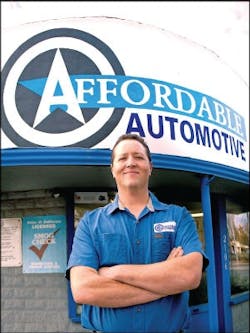Mike Button It took three generations of the Button family to push Affordable Automotive and owner Mike Button to where they are today.
As a 23-year-old would-be shop owner in 1996, Button couldn’t find anyone to lend him the money to open his own shop. His father took out a second mortgage to help.
As a 28-year-old semi-struggling shop owner in 2001, Button was just “spinning (his) wheels” without the business know-how he needed to get the shop to where it needed to be. When his first child was born that fall, he decided everything needed to change.
“It was one of those things where I either needed to close up shop and do something else or find the help I needed and figure out how to make this thing work,” Button, 39, says now. “Having our first kid really gave me that push.”
Today, Button runs a million-dollar business in Chico, Calif.—or rather, Button owns a million-dollar shop that can run itself. Through years of training and standardizing all of his shop’s processes, he has a business he feels can stand for generations—and give back to the community that’s helped him along the way.
Honestly, I have it to where I only have to be in the shop for about 10 hours each week if I want to. My freedom has really increased over the years. My business pretty much runs on its own, and I never thought in a million years I’d get to that stage. But I’m there.
When I started out, I was an owner who—well, I’m not sure you could even call me a real owner. I was a technician with my own business. I was in the shop turning wrenches all day. I was the one helping the customers. I wrote all the service. I did everything.
—Mike Button, owner, Affordable Automotive
And it wasn’t that I wanted it to be that. I just thought that’s what an owner did. I thought that was my job as an owner—make sure everything is done the way you think it should be, and no one does it better than you, right?
It took me a long time to realize that wasn’t the way to do it and that I could never truly have a successful business doing that. Changing your business is tough; it’s really hard to get yourself to do it. But it’s also the best thing I’ve ever done for it and for myself.
I’m in the office every Monday, coming in around 9 a.m. or so. The technicians are here at about 7:30 a.m., and the same goes for my lead service writer. They get everything ready for that day—they write up the tickets, park the vehicles, hand out the jobs and start handling the customers as they come in.
I have a great team. We have eight full-time employees, and right now, this is definitely the best staff I’ve ever had. My brother, Aaron, is the manager of the shop, and really, our customers see him as an extension of me as I’ve started to take a step back in things. We have the same values and the same mindset on how things need to be done, and I really think people recognize that.
We try to have everyone in our shop match our core philosophy, and that’s taking care of the customer above all else. That’s what we’re here for—our job is to help these people get back on the road safely. That’s what our job is.
I’ve really always felt that our core strength as a shop—even going back to when it was just me in there wearing all the hats—is the way we treat our customers.
There are a lot of things that go into good customer service, but one thing I would tell any shop is to not [point out every potential problem] the first time they come in. I think you immediately lose a bit of trust when you do that. I wouldn’t want that done with me, and I’d never do that to any of my customers.
Obviously, when there are problems with cars that need to be fixed, you do it, but people are in all kinds of different situations. When you really press people on those things, it’s a turnoff, and they’re going to leave.
We just try to use good judgment, realizing what can we do to get this car down the road safely? Then leave it at that. You need to give the customer all the options with their repairs and not make it feel like you’re pinning them in a corner.
The main thing I’m looking at when I come in is the numbers. In the last several years, we’ve grown tremendously.
When I took over the shop, it was originally a used-tire business. I gradually turned it into general repair, and that first year, I think we did about $240,000 in sales.
It wasn’t bad, but I had no idea how I was doing it. I didn’t know anything about really running a business.
That all changed after my daughter was born. I took a seminar and signed up for consulting. I knew that if I was going to make it work, I needed help.
It worked—I really started learning all the basics of running a business.
By 2009, we were at just under $800,000 a year in sales. This year, we’re on pace for about $1.25 million, and that’s with keeping solid profit margin numbers that we set out as goals for the year.
Each Monday, I go over the numbers from the week before. I look at everything—car count, sales, average repair order, all of it. And then I meet with my brother about it. If things are looking bad in areas, we look into it. If things are strong, we look for ways to make it even stronger.
We have a full staff meeting every Monday at lunch. We close down the shop for an hour, I buy everyone lunch, and we go over all the numbers and what we need to work on. We do this every week.
For instance, if we see that we’ve gotten any comebacks or there were any problems with repairs, we’ll go over inspection processes or how they were looking at their cars the prior week.
Every new customer—or customers that haven’t been in for a while—gets a free, full vehicle inspection. And we’re not doing this to get them on a bunch of upselling or anything like that. It’s so that we can really get to know the car and understand where it’s at. The more we know about it, the better we can help them with it.
So, that’s one of the ways, if we see something going wrong, to make sure that we’re doing our job.
In the afternoons, I may go through the shop and see how everyone’s doing, but really, they don’t need much of my help back there.
They know what they’re doing—and that’s my whole goal.
A few years back, we started really recording and taking down all of our standard operating procedures in the shop. Everything from how to greet customers to how to do a brake job; if there’s a situation that’s ever come up over that time, it’s looked at and then recorded for future reference. We have a library of them on our computer system, and we have computers throughout the shop for everyone to see it on.
It’s sort of hands-off managing, I guess you could say, but it gives everyone independence in their work, and it lets them know exactly what’s expected of them at all times.
The results have been great. I mean, it’s not the only thing we’ve changed in the last few years, but it’s a big part of our recent growth.
This area has given us a whole lot—not just my wife and I, but all of us as a shop. We feel like we owe it to the people here to give back.
We’ve helped with a number of charities over the years, and my wife and I are involved with our kids’ activities. I coach football, and my wife coaches the youth cheer teams.
We’re a part of this community, and I think that’s something more businesses need to have pride in. We aren’t here if it’s not for the people who come in our shop, and because of that, we need to be looking out for their best interests.
That’s what I’ve always tried to do, and I feel like that’s what my staff does a great job of doing now. And if you’re genuine, and people trust you, then it’s going to pay off. It makes all the difference.
About the Author

Bryce Evans
Bryce Evans is the vice president of content at 10 Missions Media, overseeing an award-winning team that produces FenderBender, Ratchet+Wrench and NOLN.
